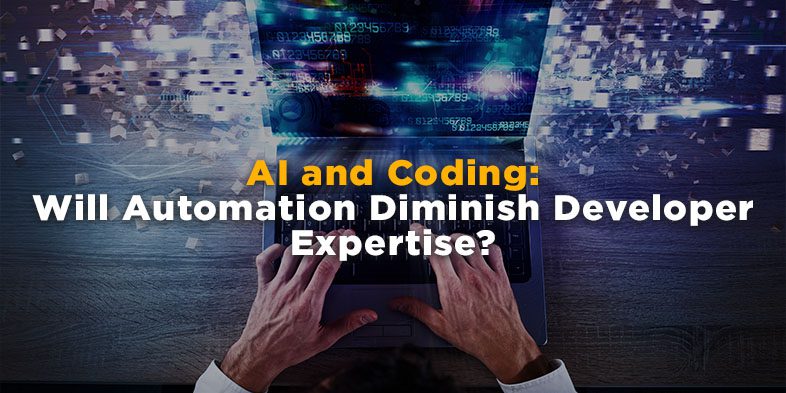AI and Coding: Will Automation Diminish Developer Expertise?


Kathleen McKnight, the VP and Principal at the market research firm KS&R, shares her commentary on AI’s role in coding, whether automation will lessen the value of developer expertise, and emerging trends in the low-code/no-code marketplace. This article originally appeared in Insight Jam, an enterprise IT community that enables human conversation on AI.
 Understanding the perceptions of different types of professionals towards emerging technologies is vital in technology research. We have been exploring how developers perceive Artificial Intelligence (AI) for over a decade. Initially, we believed developers might resist AI due to doubts about its reliability or fears about its implications for their job security. However, our research has shown a different perspective. Developers have not only accepted but also embraced AI, integrating it into their workflows.
Understanding the perceptions of different types of professionals towards emerging technologies is vital in technology research. We have been exploring how developers perceive Artificial Intelligence (AI) for over a decade. Initially, we believed developers might resist AI due to doubts about its reliability or fears about its implications for their job security. However, our research has shown a different perspective. Developers have not only accepted but also embraced AI, integrating it into their workflows.
Developers have a long history of using collaborative tools and forums to solve problems, and this growing acceptance of AI highlights yet another way developers collaborate to approach problem-solving. They recognize AI’s capabilities to automate repetitive tasks and enhance coding efficiency, transforming AI from a simple tool to a crucial partner in the development process.
But while we have heard positive sentiments about AI from developers about the incremental efficiency improvements AI produces and its ability to aid adherence to rigorous coding standards, we also know that the full potential of AI is limited by the data on which it is trained. AI reliability declines when the data it is trained on lacks diversity or relevance. A lack of transparency in how AI recommendations are made can make it difficult for developers to trust some AI systems fully.
Additionally, without careful management, AI can potentially perpetuate existing biases, posing considerable challenges that can hinder developer trust. Concern with trusting AI for coding tends to be stronger in highly regulated industries like finance and healthcare, where a slight misstep can have wide-ranging compliance implications. Ultimately, AI is reshaping traditional coding roles and potentially affecting the skills that developers need.
Dependency on AI vs. Skill Retention
As AI becomes more integrated into software development, it fundamentally alters traditional coding roles, ushering in a shift towards more strategic positions overseeing and integrating AI technologies. This shift creates new career opportunities, especially for developers specializing in AI, machine learning, and data science. These fields are becoming crucial as companies seek to harness AI for a competitive edge, creating a demand for skills that blend technological acumen with strategic insight.
To take advantage of the shift to AI, developers may want to ensure that their skill sets include machine learning algorithms and deep learning frameworks. They may also want to be proficient in languages like Python and R, which are fundamental for AI development. In specific industries—like retail and e-commerce—AI is an essential part of the developer landscape today, as AI needs range from recommendation systems to chatbots for customer service to supply chain optimization.
However, this shift also sparks a crucial debate: does reliance on AI enhance or undermine developer skills? There is a growing concern within the tech community that increased dependence on AI may lead to a decline in fundamental coding skills. Critics argue that as AI takes over more routine programming tasks, developers may lose the hands-on coding practice that is essential for honing their abilities, understanding complex codebases, and having the capacity to evaluate the code generated by AI.
Exploring Low-Code/No-Code Trends
The emergence of low-code/no-code platforms is reshaping the software development industry. These platforms enable individuals without extensive coding expertise to design applications and automate processes, democratizing the ability to build technology solutions. This trend is accelerating digital transformation, allowing the rapid deployment of technology across various sectors.
However, the simplicity of these tools also raises critical questions about the future roles of traditional developers. As these platforms gain popularity and AI-generated content becomes more sophisticated, there is a concern that companies might increasingly favor automated solutions that don’t always provide the most efficient, innovative, or elegant coding solutions, underestimating the need for human ingenuity and problem-solving skills to keep technology moving forward.
To stand out against no-code and low-code platforms, developers will want to emphasize their ability to leverage their coding skills to create customized and flexible solutions that precisely meet the needs of their clients or organizations. Developers are more likely to be able to optimize code for speed and resource utilization vs reliance on low-code/no-code platforms. While low-code/no-code platforms can provide basic solutions to process improvement, they are no substitute for developers recognizing a specific issue in their company and devising a customized solution.
Highly regulated industries like healthcare, which deals with sensitive patient data, or the financial services industry—which has stringent regulatory standards, robust security measures, and compliance protocols—are better handled by traditional development, as low-code/no-code platforms may not have the necessary customization.
The Critical Role of Human Oversight
Despite the impressive capabilities of AI and low-code/no-code platforms, the technology community strongly believes in the irreplaceable value of human oversight. Experienced developers play a crucial role in evaluating and refining AI-generated code to ensure it is functional and operates effectively under real-world conditions. This human element is vital for debugging, making ethical decisions, and developing complex, customized solutions—areas where AI still falls short.
Developers can use their skill sets to monitor AI in various ways, from collaborating with stakeholders to understand their needs to model training and evaluation. Developer monitoring of AI can take many forms, including detecting and mitigating biases, ensuring compliance, and assessing performance as AI-written code enters production environments.
One example of this might be monitoring fraud detection in the finance industry. Developers can help fine-tune the AI models to reduce the number of false positives that can hinder customer experience. AI-driven algorithms in finance require ongoing supervision to ensure they don’t encourage unethical behavior in areas like trading that could cause market disruptions.
It is also important to ensure that every developer maintains basic coding skills across a wide variety of languages to ensure they can monitor and evaluate code generated by AI remains. As the software development sector evolves, the risk of becoming overly reliant on AI is real. This dependency could potentially lead to a decline in innovative problem-solving skills. To counteract this risk, ongoing education and active engagement in foundational coding practices are essential. Developers must balance the use of AI tools with opportunities to apply their coding skills creatively and critically.
Envisioning a Collaborative Tech Landscape
Educational institutions and industry leaders are pivotal in preparing developers for an AI-augmented future. By updating curricula to include advanced AI techniques and robust programming fundamentals, educational institutions can ensure that the next generation of developers is versatile and proficient.
In the future, developers will need to be trained in AI and have detailed knowledge about how AI may impact the industry they are applying to. Universities like Stanford and MIT offer specialized courses and research in AI applications for healthcare, like predictive analytics for patient care and AI-driven medical imaging. Technical universities like Georgie Tech and Purdue are providing hands-on training in AI applications for smart manufacturing and industrial automation. Similarly, industry policies that promote continuous learning and skill development can help sustain a technologically adept and creatively empowered workforce.
The future of AI in software development holds immense potential for innovation and efficiency. We can harness the best of both worlds by fostering a collaborative environment where AI supports and enhances human skills rather than replacing them. The ideal scenario envisions AI as a partner that elevates developer creativity and problem-solving capabilities, ensuring that technology enriches software development without compromising the invaluable human element.
If developers take advantage of the many new opportunities that arise with AI, it seems likely that developer coding skills, combined with critical thinking and industry knowledge, will remain indispensable for building innovative solutions that address complex challenges going forward.



















